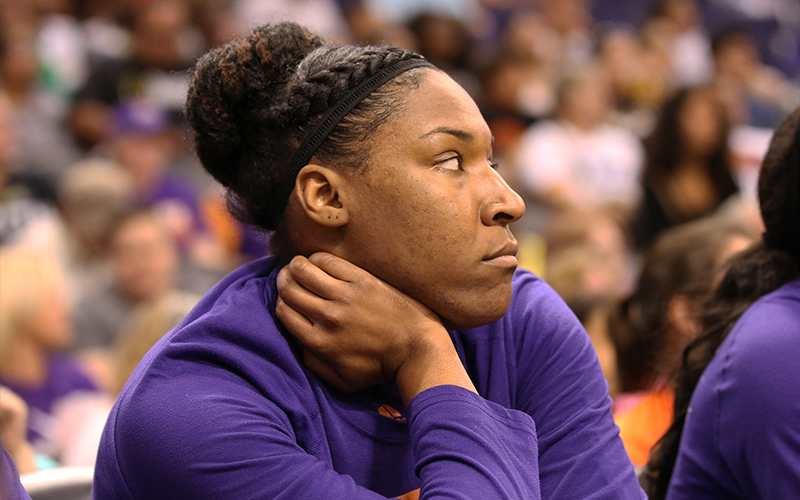PHOENIX – Kelsey Bone is taking her social injustice protest to a bigger stage.
On a night when the Phoenix Mercury clinched a berth in the WNBA playoffs, the 24-year-old center kneeled during the singing of the national anthem to raise awareness of alleged racial inequality and the recent shootings by and of police officers around the country.
“This is an injustice that’s happening,” Bone said. “I think we’re just quiet about it right now and that’s something we have to change.”
San Francisco 49ers quarterback Colin Kaepernick was the first to kneel during the presentation of the American flag when he did so during a preseason game last month, and has publicly stated he will continue to do so until change is made.
The @PhoenixMercury ‘s Kelsey Bone kneels during the National Anthem. @cronkitenews pic.twitter.com/kfAbon3nSF
— lindsey wisniewski (@lindsniewski) September 16, 2016
Bone, who was acquired by the Mercury in June, joins Kaepernick and a number of high-profile athletes from across the country, including the Denver Broncos’ Brandon Marshall, Miami Dolphins’ Arian Foster and United States Women’s National Soccer Team’s and Seattle Reign FC’s Megan Rapinoe, who have partaken in silent protests.
Bone spent a large part of her childhood with her grandparents in Baton Rouge, Louisiana, a city that made national headlines twice in July. Video captured Baton Rouge police fatally shooting Alton Sterling, an unarmed black man. Less than two weeks later, a Missouri man attacked police officers in the city, leaving three wounded and three dead.
“I have cousins, I have brothers, I have uncles, I have a father. So for me, it hits close to home,” said Bone, in her fourth year in the WNBA. “It’s happening everywhere and I think it’s something we need to talk about and something that needs to be addressed.”
Bone said the first time she kneeled during the anthem was before the Mercury’s home game Sunday against the Atlanta Dream.
While Thursday was Bone’s third straight game taking a knee, coach Sandy Brondello said she did not realize the Mercury center had been protesting until a reporter informed her after the game. There was also no noticeable reaction at Talking Stick Resort Arena from fans to Bone’s protest.
Brondello commended Bone for standing up for what she believes in.
“I don’t have a problem with it if she wants to do that,” Brondello said. “She’s an individual player, an individual person. I’m not forcing (or telling) them what they can and can’t do.”
This isn’t the first time this season members of the Mercury organization have taken a political stance.
In July, the Mercury, New York Liberty and Indiana Fever faced fines after wearing black T-shirts displaying phrases ‘Black Lives Matter’ and “Dallas 5.” The shirts referenced the police shootings of Philando Castile and Alton Sterling and the five Dallas police officers who died during a deadly sniper attack following a Black Lives Matter rally on July 9.
WNBA President Lisa Borders decided to retract the fines, acknowledging the league’s support of athletes using their public platform to better address societal issues.
“All of us at the WNBA have the utmost respect and appreciation for our players expressing themselves on matters important to them,” Borders said in a statement released just before the WNBA took a monthlong hiatus for the Rio Olympics. “We plan to use (the break) to work with our players and their union on ways for the players to make their views known to their fans and the public.”
However, Bone doesn’t feel much has been accomplished since then.
“We had a really healthy discussion going on leading into the Olympic break,” Bone said. “The Olympic break kind of worked against us as a league and as players just because nobody talked about it for two weeks and we focused on what was going on in Rio.”
As the Mercury prepare for the playoffs, Bone said she will continue to fight to bring awareness to the subject matter, even if she kneels alone. She realizes change doesn’t happen overnight.
“We’re not going to fix this tomorrow. We’re not going to fix this today,” Bone said. “We might not be the ones who benefit from this. But maybe our kids will, maybe our grandkids will.”
